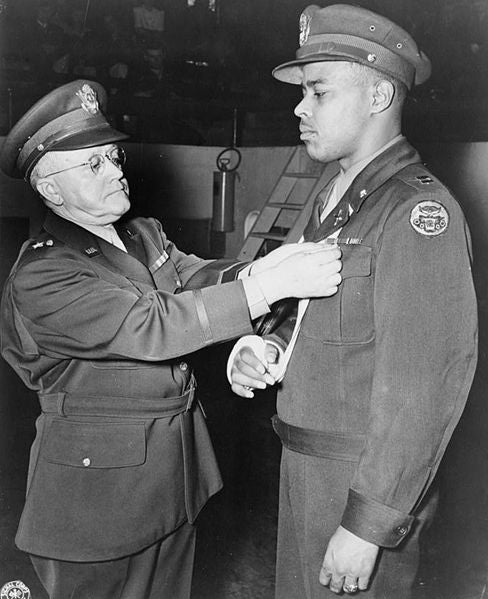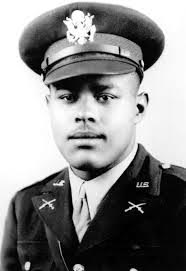The story of Captain Charles L. Thomas, U.S. Army, Medal of Honor
Published 10:27 pm Friday, November 6, 2020
|
Getting your Trinity Audio player ready...
|
NOTES: This story was updated Tuesday, Sept. 6, 2022, at the request of the author. The original story was published online Friday, Nov. 6, 2020.
Captain Charles Leroy Thomas was the second black American to be awarded the Distinguished Service Cross during WW II. It would take another 53 years before Captain Thomas’ award was upgraded to the Congressional Medal of Honor.
Charles Leroy Thomas was born on April 17, 1920 in Birmingham, Alabama. Like so many other black families from that time, his family soon moved north to Detroit, Michigan. Charles grew up showing a keen interest in planes and electronics. He graduated from Cass Technical High School in 1938 and joined his father, working at the Ford River Rouge factory making steel. While still working, he enrolled at Wayne State University, studying mechanical engineering. In January 1942, Charles was drafted and inducted into the U.S. Army.
Charles L. Thomas took basic and advanced infantry training at Camp Wolters and was assigned to the 614th Tank Destroyer Battalion at Camp Carson, Colorado when it was activated on July 25, 1942. He rose to the rank of sergeant and when the 614th arrived at Camp Bowie, Texas for further unit training, he was selected to attend the nearby Tank Destroyer OCS at Camp Hood, Texas. He returned to the unit after being commissioned a Second Lieutenant on March 11, 1943.
Charles Thomas was named commander of C Company, 614th Tank Destroyer Battalion and sent to Fort Hood at Killen, Texas. His unit and the rest of the 614th was deployed to England in August 1944. In October, they landed on Utah Beach at Normandy under the command of Lt. Col. John P. Blackshear. They later joined Gen. Patton’s Third Army near Metz, France and saw their first combat on November 28. The 614th was assigned to the 103rd Infantry Division on December 5.
On December 14, 1st Lt. Thomas volunteered to lead 3rd Platoon, C Company, in an attack to capture the town of Climbach, just 5 miles from the German border. Thomas was in a M20, armored scout car, ahead of a group of Sherman tanks and accompanying infantry. As they approached, up a hill to Climbach, Thomas’ scout car was hit by fire from German tanks, and he was wounded. As he began helping his crew from the car, Thomas was wounded again in the chest, arms and leg. Despite his wounds, he directed the placement of the unit’s anti-tank guns. The covering fire from the anti-tank guns allowed units behind Thomas to outflank the Germans, and continue the fight. Before being evacuated, Thomas briefed the 3rd Platoon leader of C Company, who continued the fight for four hours. The German defenders finally withdrew to the Siegfried Line and the town of Climbach was captured. Thomas’ 3rd Platoon, C Company would lose two of its four guns and half its men were casualties [3 dead and 17 wounded].
For its brave conduct in the face of overwhelming odds, 3rd Platoon, C Company, 614th Tank Destroyer Battalion was awarded the Distinguished Unit Citation. Theirs was the first black combat unit to receive this award.
On February 20, 1945, Captain Thomas was awarded the Distinguished Service Cross for his actions. When told of his award, Thomas said, “I know I was sent out to locate and draw the enemy fire, but I didn’t mean to draw that much. I was just trying to stay alive out there.” Captain Thomas returned home a hero, but continued to down-play his actions.
Charles L. Thomas remained in the Army until retiring in August 1947, with the rank of Major. In 1949, he married Bertha Thompson. They had two children, Linda and Michael.
Thomas worked as a missile technician at Selfridge Air Force Base in Michigan and later as a computer programmer for the Internal Revenue Service. He died of cancer at the age of 59 in 1980 and was buried at Westlawn Cemetery in Wayne County, Michigan.
In 1993, the U.S. Army commissioned a study by Shaw University in Raleigh, North Carolina, to determine if there had been racial disparity in reviewing recipients for the Medal of Honor. The review was completed in 1996 and the study recommended that 10 black Americans, who had served in WW II be awarded Medals of Honor. Later that year, Congress passed enabling legislation to allow the awards. In October 1996, seven of the ten recommended were approved, including Major Charles L. Thomas. In January 1997, President Bill Clinton awarded the seven Medals of Honor. A niece of Major Thomas accepted the posthumous award on behalf of the family.
John Vick
[Sources: Wikipedia; The Congressional Medal of Honor Society; tankdestroyer.net; Black History in America; artilleryocsalumni.com].



